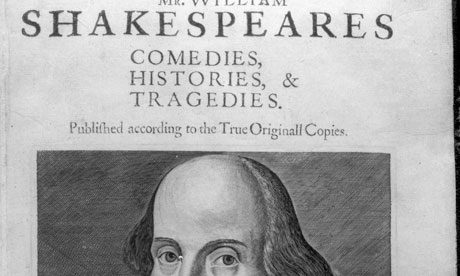
A conman faces a long jail term for trying to make £1m by selling a stolen copy of the First Folio of Shakespeare's plays. Raymond Scott, who drove a Ferrari and bought designer clothes on non-existent credit, was cleared of the actual theft but convicted of handling stolen goods and smuggling the 387-year-old book to the US.
Judge Richard Lowden remanded him in custody at Newcastle crown court and told him: "There will'be an inevitable substantial custodial sentence."
The chief prosecutor, Chris Enzor, called Scott "a dishonest conman and serial thief".
Scott was arrested two years ago after taking the folio to the Folger Shakespeare Library in Washington DC and giving experts there a complex and fantastic account of acting for a Cuban commando officer whose mother had kept "the old English book" in a chest at her home in Havana for years.
His jaunty air, claims of a jet-setting life and gift of bow ties and a cake to the American academics failed to calm suspicions, and the book was rapidly identified as the copy stolen from Durham Cathedral library in 1998. The FBI was called in and liaised with police in Britain who turned up a string of fraud and theft offences going back 32 years.
Scott had told the Folger's staff that he would return after a business trip to Cuba and Scotland, but he answered the door when police called at the terrace house where he lived with his mother in the new town of Washington near Sunderland. Unruffled, he told them: "I'm an alcoholic and need two bottles of top-of-the-range champagne every day, but only after 6pm. I hope you have some in the police station."
He kept up his charade throughout the four-week trail, arriving for the opening in a limousine with four hired heavies, and later dressing up as Che Guevara and spraying photographers with champagne. But he faces an obscure future as a footnote in Shakespeare studies, associated with serious damage to one of the finest of the 230 known surviving copies of the first printed collection of the plays.
The book was stolen in daylight during opening hours at a sparsely-attended exhibition in the cathedral library, along with an early English translation of the New Testament worth £60,000 and a fragment of a poem by Geoffrey Chaucer enclosed in another mediaeval volume. Only the Shakespeare has been recovered, and today's verdict leaves the question hanging as to who prised open locked cabinets holding the books.
Scott, who is 53 and single, exercised his right not to give evidence in court, but earlier told police that the academics had conspired against him. He said: "Do you seriously think I'm going to walk into the foremost Shakespeare library in the world and, using my own name and address, with my fingerprints all over it, hand them a copy knowing and believing that it's got a doubtful provenance?
"A book worth millions - that I'm going to walk into such a place with such a book and ask to see the head librarian? It is all a very cosy world. It is sort of like a conspiracy; they are ganging up against me."
But the court heard that the slicing of pages out of the folio, to obscure known features of the stolen copy, overlooked a series of less obvious marks - described by expert witnesses as "the folio's DNA". Enzor said: "Although he was a convicted thief, Scott was not used to handling such high profile stolen goods, taking the folio into the world's biggest Shakespeare library to have it authenticated. He didn't anticipate the museum immediately becoming suspicious."
The court heard that he had never worked and had piled up £90,000 in debts, most recently by trying to impress a waitress he had met on holiday in Cuba. Prosecutors alleged that she was the inspiration for the false heritage he invented for the book, including the commando and a range of other characters whose existence has never been proven.
The book will be exhibited again at the cathedral library shortly, under much more stringent security than before. It came to Durham when John Colin was appointed bishop in 1660 after buying the folio when he was master of Peterhouse college, Cambridge before the English civil war.
It was valued at £3,000,000 before its binding, title page and other leaves were removed. But academics argue that its cultural worth, especially to the North East of England, is beyond pricing.
The writer Bill Bryson, who is chancellor of Durham University and author of a well-reviewed book on Shakespeare, said: "Shakespeare's First Folio is arguably the most important book in English literature.
"It is fantastic that Durham's copy is coming home at last. I look forward to joining everyone in welcoming this wonderfully important book home to the university and the city when it eventually goes on display."

